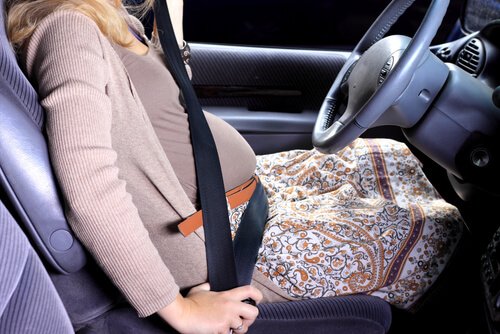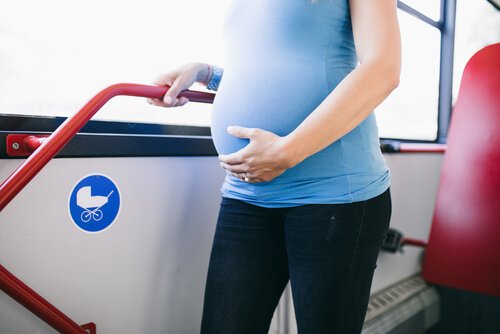Traveling While Pregnant: Is It Safe?

In order for a trip to be risk free and enjoyable, it’s important for pregnant women to take a few things into consideration. These precautions will depend on the current stage of pregnancy, the mother’s state of health, and the means of transportation.
When to travel?
To know when it’s a good time to travel during pregnancy, you should first consider what trimester you’ll be in. This serves as a perfect guide for what precautions you’ll need to take.
First trimester
During your first trimester, long trips aren’t a good idea. It doesn’t matter what means of transportation you’re taking. The reason is because this is the time period in which miscarriages are most common.
These losses aren’t directly related to traveling while pregnant. However, it’s always best to avoid putting yourself and your baby at risk.
Another reason is that symptoms are more intense during the first trimester of pregnancy. Nausea, vomiting and overall discomfort can make any journey unpleasant.
Second trimester
If you need to travel while you’re pregnant, this is the best time to do so. The bothersome symptoms that are typical during the first trimester have faded away. The risk of miscarriage is also significantly reduced.
If you’re counting your pregnancy in weeks, the second trimester stretches from week 12 to week 28. If you’re keeping track of your pregnancy in months, then this will be months 4 through 6.
During your second trimester, your belly still hasn’t grown that much. Therefore, you’ll be able to travel fairly comfortably. Just the same, you should check with your gynecologist before finalizing your plans.

Third trimester
By this point in your pregnancy, you’ve already gained quite a bit of weight and lost quite a bit of agility. Not to mention, you’re feeling more worn out. For this reason, it’s not a good idea to do any long-distance traveling that prevents you from standing, walking or stretching out.
At the same time, there’s also a chance of premature labor during this period of pregnancy. Therefore, it’s best to limit yourself to short trips at this point.
You should also keep your medical history on hand as well as any other pertinent documentation in case of an emergency. At the same time, avoid any remote destinations that make medical assistance difficult to access.
What means of transportation?
Not all journeys are alike. The advantages and disadvantages of traveling while pregnant depend on the means of transportation and the distance traveled. Below, we’ll provide some more specific recommendations:
Traveling by plane
There are plenty of myths around traveling by plane. Some believe that plane rides can lead to miscarriage or premature birth, but this isn’t the case. Airplane cabins are controlled environments. There are no issues with atmospheric pressure, temperature or oxygen.
Pregnant women should opt for aisle seats so they can get up frequently to walk and stretch. From 36 weeks and on, pregnant women are not allowed to fly.
“The precautions that you must take will depend on your current stage of pregnancy, state of health, and the means of transportation.”
Traveling by car
This is a good means for traveling, since riding in a car allows you to make as many stops as needed. When pregnant, you should stop at least every two hours to stretch your legs.
It’s also important that you go to the bathroom whenever you need to, since holding in your pee can be dangerous during pregnancy. And, of course, you should always place your seatbelt below your belly.
Pregnant women should only drive up until week 32. From then on, you might have a hard time steering comfortably. It’s best to avoid risks and stay away from the wheel during the last weeks of pregnancy.
Traveling by bus
This means of transportation isn’t such a great idea. In most cases, you won’t be allowed to get up and walk around to stretch your legs, which could be an issue. If you must travel by bus, make sure the bus has a bathroom you can use on the road.

Traveling by cruise ship
The most common problem that pregnant women may suffer while traveling by water is nausea. As for cruises, you should check the quality of the food in order to avoid food poisoning, as medical attention is limited.
It’s hard to transport passengers from a cruise ship to access emergency medical services. The risks one is willing to take will be up to each individual woman.
Train
This is a good option, especially high speed trains, as they’re usually steady during movement. There’s also room to walk around as well as bathrooms.
Where to travel to while pregnant?
It’s important to evaluate where you’re going to travel. First of all, consider how far you’re going in relation to how far along your pregnancy is. Second, keep in mind the conditions of the place you’ll be visiting.
Be sure to avoid destinations where malaria, dengue fever, zika and other epidemics are present. Pregnant women shouldn’t get any vaccines without first checking with their OB/GYN. Many vaccines aren’t safe during pregnancy.
Recommendations for traveling while pregnant
No matter where you’re going, there are general recommendations you should keep in mind to protect your health. Some of the most important and easiest are the following:
- Take water along. It’s important you stay hydrated during the journey.
- Wear comfortable clothing. Avoid clothing that can reduce circulation.
- Don’t skip meals. Pregnant women should carry provisions along with them and avoid long periods of time without food.
- Walk. Conditions should allow pregnant women to stretch our their legs and care for their circulation.
Whatever the case, always be sure to check with your doctor before making travel plans. Each pregnancy is different, and a medical professional is the best person to tell you if traveling while pregnant is safe for you and your baby.
This text is provided for informational purposes only and does not replace consultation with a professional. If in doubt, consult your specialist.








